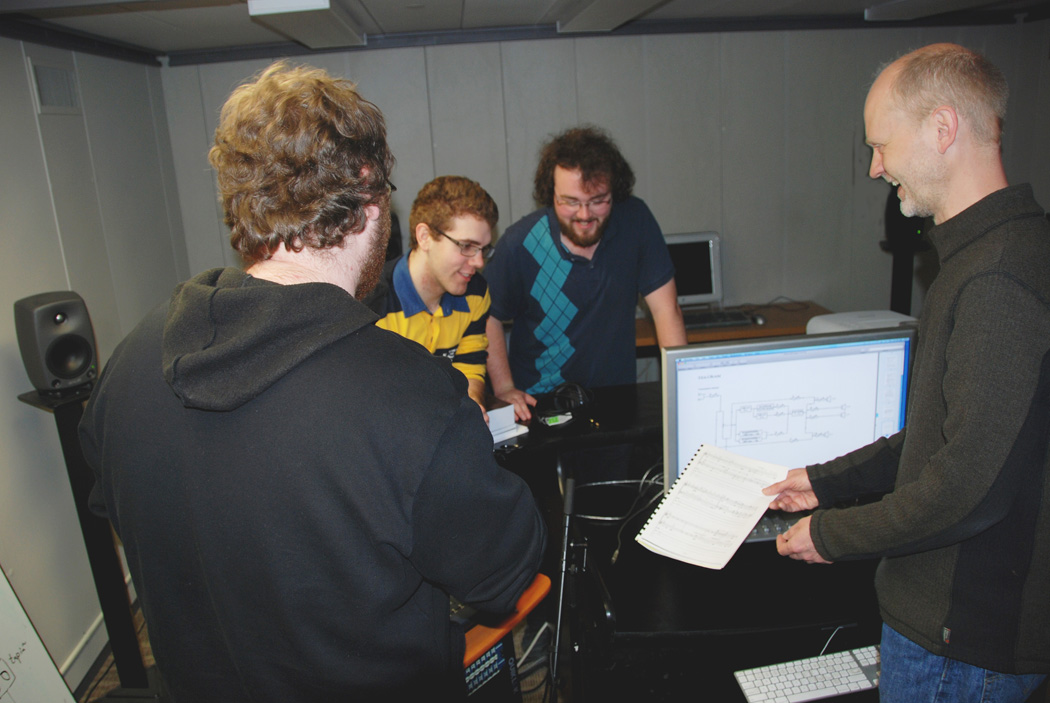
Örjan Sandred teaching in Studio FLAT. Students (l to r): Zach Bales, Troy Jasper and David Betz.
Faculty Profile: Örjan Sandred
Örjan Sandred, associate professor, Desautels Faculty of Music
Atmospheric and mysterious, with humming undertones and a crystalline array of notes sounding intermittently above the hum, “Ice Fog,” a 2010 composition by Örjan Sandred, composer and associate music professor at the Desautels Faculty of Music, is a quiet piece for alto saxophone, piano and live electronics. The piece sounds a little, perhaps, like a proper accompaniment to ice fog itself.
It’s one example of exciting areas of exploration and experimentation of music and composition in relation to technology.
Sandred: ‘Art is very close to research — you are reaching to the unknown’
Sandred uses computers a lot, he says, but he is a composer of both instrumental and computer music. His instrumental works range from music for Symphony Orchestra to solo instruments, and several of his later compositions expand the “expressitivity” of acoustic instruments with live electronics.
Sandred uses technologies within his pieces and in composing them, and also teaches methods of composition in the Faculty of Music’s Studio FLAT, the studio he founded for computer music research and production.
Many of his own compositions are the result of his search for new methods of composition and use computerized rule-based systems (a sub-branch of artificial intelligence) to formalize the musical structure.
For Sandred, composition is very closely linked with his research and he is fascinated by the complexity of music. And it’s fascinating to hear him discuss music, as well as composition and art more generally.
When I ask Sandred where “Ice Fog” started, for instance, he politely defers, smiling. “I prefer to talk about music in different terms. As a composer, you deal with how to communicate, and music is about communicating.”
Sandred: In music composition, ‘the tools you use will affect the outcome.’
The method you choose will influence the result, however. “I do believe the tools that you use will affect the outcome — and you can do that unintentionally but often deliberately as well,” he explains.
“If you are a painter, for instance, you choose your tools with a very clear aim for how you want it to look, for the expression you intend. So I pick my tools for the result I want, and if I’m not happy with them perhaps I could switch my tools.”
The question of intuition is also interesting, he says.
You apply a lot of structure, knowledge, experience and rules that you have internalized or that are in your unconsciousness. “As a professional composer, I want to bring those into consciousness in order to work with them compositionally. If you only rely only on intuition, you tend to repeat a lot, because you are not aware, and you fall into similar patterns.”
It starts with composition rules or formalizations from 100 years ago applied to the computer, he says.
“So if they formalized certain rules for composition in the old days, say — for example, it could be rules about what chords generally follow after one another, or a rule such as returning to the tonic to end a piece – you can use the same language of formalization, so to speak. But you might end with another chord, maybe it’s not the tonic but a newer-sounding chord.”
And there are many other details as well, which the computer can track and analyze, and that Sandred can then alter. “That just would not have been possible before,” he says.
That modernist expectation of “making something new” is still very strong in art music, he says.
“As in other forms, rather than repeating something that has already been done, [the motivation is] to go to the unknowns. This is where research comes in.
“Art is very close to research, I think — you are reaching to the unknown. Sure, art is self-referential to some extent, but it is also about expressions of human mind and perception and emotion. Ultimately, I think that is where you end up .”
Q & A
Activities outside work: Since I spend my working days mostly at my desk, I try to be physically active with my family over the weekends. This winter, I enjoyed the river trail very much: a unique possibility in Winnipeg.
Best place to visit: This year I enjoyed revisiting Shanghai, which is a very interesting city. Every year I go back to Paris for work: a city full of life and cultural events.
Favourite music: I tend to like composers that were active during periods when music changed. Monteverdi brought music into a new phase in the early 17th century, just as György Ligeti did in the early 1960s.
Faculty Profile is a regularly appearing column that features faculty of the university in the context of their research. This article first appeared in the April 5, 2012 edition of The Bulletin.






